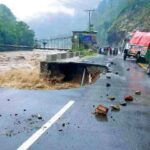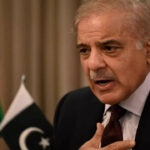PESHAWAR, Jan 15 (APP): Notwithstanding with the mounting pressure of the PTI leadership, former Chief Minister Pervez Elahi’s irrational act to dissolve Punjab Assembly despite friendly Opposition has widely been criticized by political leaders and experts, who considered it negation of democratic principles and parliamentary norms besides sanctity of votes in the country.
“The premature dissolution of Punjab Assembly has shattered the confidence of people of Punjab, who are ready to make all those political parties and leaders involved in this illogical act accountable for their irrational actions in the upcoming election,” said Ikhtiar Wali Khan, PML-N spokesman KP and Member Provincial Assembly while talking to APP on Sunday.
“Being the students of political science, we all knew that democracy derived strength from the power of people, who had a strong say in policies and decision-making of the governments while accepting each other’s criticism with open heart for bringing about improvement in the system and address peoples problems at their doorsteps rather disolve assemblies prematurely,” he said.
He said early dissolution of Punjab Assembly has signified political intolerance in PTI leadership as well as in its allied parties and people of the largest province would take revenge from them in the upcoming election.
“Political parties and leaders make struggle to achieve majority in the assemblies for formation of a strong political government to implement their election manifestos, fulfill promises and address masses’ problems at the gross root level rather dissolve assemblies against the wishes of masses,” he said, adding premature disolution of Punjab Assembly was tantamount of not accepting people’s mandates.
“How PTI and its allied parties would face voters of Punjab after shattering their confidence by moving against democratic norms and sanctity of votes,” he told APP.
He said PML-N had used all legal and constitutional options to prevent disolution of Punjab Assembly despite the political stubbornness and irrational attitude of PTI leadership.
Ikhtiar Wali said that Punjab Governor did not become part of the premature dissolution of Punjab Assembly and PTI should now get ready of people wrath in the country’s largest province.
He claimed that the blackmailing attitude of opponents would not be accepted and politics of agitators would come to an end forever after the election in Punjab.
“The people knew that how the mandate of Pakistan’s biggest province was stolen from the PML-N in the 2018 election,” he said, adding that his party would regain its mandate by winning Punjab Assembly elections with two-third majority.
Ikhtiar Wali said that coalition government after coming into power came to know that Pakistan was facing political and diplomatic isolation as even our friendly countries have kept distance from the country due to poor policies of the Imran Khan’s government.
He said the country was plunged into heavy foreign loans and debts burden, high inflation and energy crisis during poor Imran Niazi rule whose corrupt practices were later exposed in PTI foreign funding case by the Election Commission of Pakistan.
Professor Dr A.H. Hilali, former Chairman, Political Science Department, University of Peshawar said in democracies, people elect their representatives to govern them through a parliamentary form of government for five years and take decisions for their well-being rather wait for long time due to premature disolution of the assemblies.
He said people of Punjab would economically suffer due to issues related to upcoming budget after disolution of the Punjab Assembly.
He said democracy was more than just a set of government institutions as it largely depends on political tolerance, values, mindset, practices and norms inevitable for socioeconomic growth and human development.
Dr Hilali said many forms of governments including monarchy, aristocracy, colonialism and dictatorship were practiced in the world but all these systems were gradually replaced following the introduction of democratic form of government in ancient Greece.
The notion of democracy is basically stemmed after the treaty of Westphalia (1648) and it became socially more favorable after the French Revolution in 1789, he said, adding that political philosophers like Rousseau also advocated about democracy as the most justifiable form of government to address the people’s issues based on political tolerance and acceptability of each others’ mandates.
He said until the mid-20th-century, democracy did not achieve smooth sailing and had to compete with the challenges of nazism, fascism and totalitarianism till the end of the World War II. Eventually, after 1945, the norms of democracy became more famous across the world including the Subcontinent.
Democracy had also introduced in Pakistan and India after achieving independence from British in August 1947, however, this system could not flourish in the former due to unavailability of constitution and untimely deaths of the father of the nation and first governor general of Pakistan, Quaid-i-Azam Muhammad Ali Jinnah on September 11, 1948 and first Prime Minister of Pakistan, Nawabzada Liauqat Ali Khan on October 16, 1951.
Professor Hilali said democracy was derailed several times in the country after political parties did not accept each others’ mandates due to political intolerance and agitation by overthrowing political governments besides premature disolution of assemblies under draconian law of 58 2(B).
Since its inception, he said Pakistan had been confronting various challenges including growing political, societal, and religious intolerance mainly due to the fractured governance structure built around many fault lines that often ignited political and economic crises owing to the derailment of the democratic system and assemblies disolution on several occasions in the past.
The recent surge in political and religious intolerance and wrangles between political parties and workers for powers were spoiling the country’s development and hampering economic rehabilitation efforts, he added.
He said dissolution of Punjab Assembly was another example of political intolerance in our country.
“The government of Prime Minister Zulfiqar Ali Bhutto was overthrown after the nine religious-political parties of the joint opposition from the platform of Pakistan National Alliance (PNA) had launched mass agitation movement due to political intolerance besides claiming electoral fraud and rigging allegations during the general elections of March 7, 1977.”
He said the PNA had started agitation movement after it bagged only 36 seats and PPP secured landslide victory with 155 seats, adding one seat was won by the PML (Qayyum) and eight seats were clinched by the independent candidates in the total 200 seats of the Parliament during 1977 general elections.
In spite of strong denial of the rigging allegations by the PPP, he said, the PNA’s agitation movement sparked riots and unrest in the country after massive demonstrations and violent anti-Bhutto protests. The law and order situation and rioting had caused &765 million loss to the country’s economy while exports slashed by 35 percent at that time,” he said, adding democracy was derailed for the third time on July 5, 1977.
He said the elected assemblies and governments of PPP and PMLN had been dissolved and dismissed on allegations of corruption, poor governance, mismanagement and rigging elections during 1988-1999 and its negative outcome emerged before us as of October 12, 1999 martial law.
He said in 2014 sit-in staged by the Pakistan Tehreek-e-Insaf chairman, Imran Khan and Pakistan Awami Tehreek (PAT) Chairman, Dr. Tahirul Qadri accused PML-N for making rigging in 2013 general election was another example of political intolerance and accepting not each others’ mandates.
The PTI and PAT’s allegations against Nawaz Sharif government were rejected by a high-powered commission led by former Chief Justice of Pakistan, Nasirul Mulk who declared that the 2013 polls were organized and conducted fairly and in accordance with law. The Commission had also ruled that PTI’s request for a probe was not justified.
Asif Yousafzai, senior lawyer said that articles 8-28 of Chapter-I of 1973 Constitution protect the rights and dignity of all Pakistanis. Besides freedom of speech, movement, assembly and expression, he said that no citizen would be subjected to any form of torture, derogatory remarks and abusive languages on the basis of political affiliations, race, religion and caste.
He said constitution has empowered people of Pakistan to enjoy all rights through their respective elected governments, and that people are ultimately suffer if any Assembly of the federating unit dissolve prematurely.
Awami National Party leader and former Environment Minister, Wajid Ali accused Imran Niazi and his allied parties for depriving people of Punjab from a government despite the fact that nearly eight months were still existed in completion of tenure of the present elected assemblies and governments.
He claimed that PTI had tried to put the country’s into political anarchy and destabilise democracy after an illogical act in Punjab.
He said PTI’s flagship billion trees afforstration project was taken over by NAB exposing it’s good governance claims while the province was plunged into flour and CNG crisis.
The experts said there was no justification of Punjab Assembly disolution after only eights months were left in completion of the present assemblies’ tenure.
They said PTI and Pervez Elahi has made a big blunder that would face people wrath in the Punjab election.







